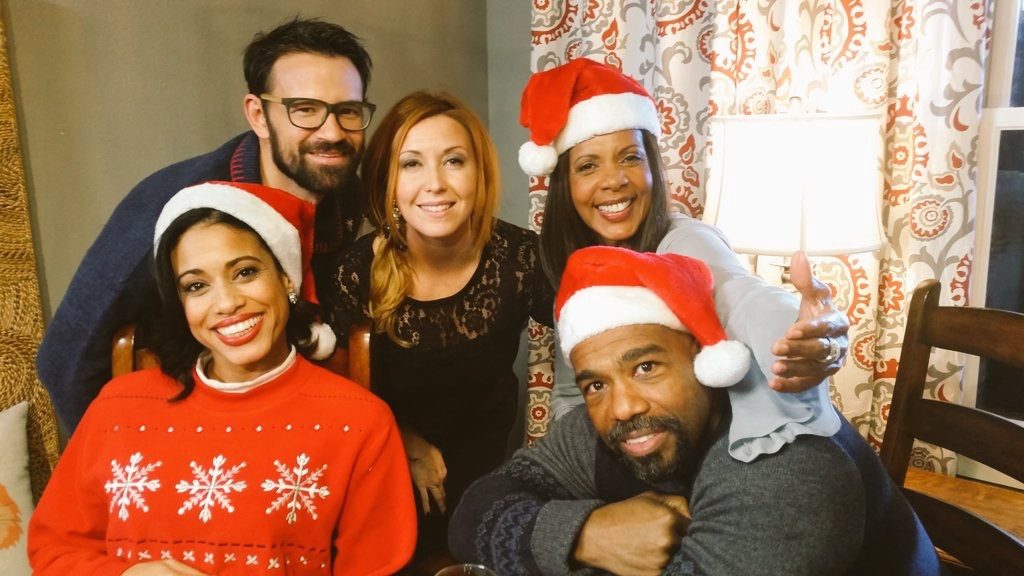Guest Post by Jennica Schwartzman
The theater goes black. I’m watching the credits at the end of my latest film. It’s a private debut screening, and my first time watching “Parker’s Anchor.” I wipe away tears — I’m five months pregnant — and attempt to calm my nerves, and take in the sweet applause that swells and settles after each name fades from the screen. Each credit, like each frame of the film, is the product of a choice made between the producers, director, and production team.
A moviegoer, husband to one of our lead female actors, leans over in the dark and whispers praise for the film. He says, “Thank you for making the effort to include diversity.” I do not know what to say. But I can’t take all the credit for a colossal effort; it happened one choice at a time.
Several years ago, my husband, Ryan, and I became partners in filmmaking under the name Purpose Pictures. Our movies, like our life together, reflect our belief in gender equality. That’s the easy part: we have one man and one woman in the partnership so it’s pretty simple to have both perspectives represented. Our guiding principle is to try to choose truthful over commercial.
The film community is more aware than ever about conscious, equitable filmmaking thanks to organizations like the Geena Davis Institute on Gender in Media, discussions of intersectional feminism, and markers such as the Bechdel Test, Vito Russo Test, Mako Mori Test, and the Shukla Test. Colleagues open my eyes with their progressive opinion pieces about the still-uphill battles against being depicted and treated as Other. Friends of many backgrounds graciously school me on up-to-date vocabulary and controversies. And though I am putting into practice what I discover, I still have a long way to go.
So we had a lot of inspiration when we set out to make “Parker’s Anchor,” and we decided that the story needed to be a uniquely female experience.
As we developed the movie, it took more effort to include other often-marginalized voices. There were uncomfortable discussions; I didn’t like how I sounded. As a cisgender white woman in my 30s, I acknowledge my privilege. Do I sound racist / sexist / trying too hard / not trying hard enough? If we can’t find a baby to cast in Arkansas in the role of the “featured baby” with the right ethnicity does it matter? Is it noticeable? We needed to create a safe space for our production team to openly talk through ideas and and situations like this without hurt feelings. I needed to Google and research and make choices I felt unqualified to make. But these choices were my job — I am a filmmaker, and therefore I am a job creator.
I needed more people in the room with different backgrounds — both producing team and cast — so I could listen instead of speculating. More women whose experiences and perspectives would inform the storytelling. More people of color in the room and on the screen. A range of ages and backgrounds. I discovered that the question wasn’t just “How do I create?” It was “Who can I invite to create with me?”
These choices paid off in ways both quantifiable and not. But numbers help tell the story, so here goes: Ryan and I represent a 50/50 writing team when it comes to our gender. Our producers are equally balanced, men and women. Our large speaking cast is 58 percent female and 42 percent male, with lead roles and screen-time weighted toward female and 50 percent people of color. Our crew was roughly 40 percent female and 60 percent male.
None of these statistics were an accident. Hiring a more-balanced set, in a traditionally male-dominated industry, doesn’t happen by chance, but it is fair. Just. How it should be. We made it happen choice by choice — and we loved the outcome.
Our film exists now: a woman’s journey of loss and starting over, diving deep into a female world including vulnerable private moments few men get to witness. I birthed this film. I represent this film. I am responsible right where I am. And thanks to the pioneers who fought hard battles before me, I can effect change one choice at at time. I want to participate in this industry as a responsible member, not leaving grand ideas for when I have enough time, money, or connection. I want to do better now. I am my own boss today. I am my own artist today. With my next film, I will continue to invite underrepresented voices to my table. And I will continue to learn and grow with each film.
Jennica Schwartzman, a member of The Producer’s Guild of America, is an actress/writer/producer that loves tackling a project from idea to distribution. She works alongside her husband and business partner, Ryan Schwartzman. You can learn more about “Parker’s Anchor” on the film’s Facebook page.







